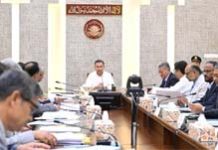C T Online Desk: The first phase of the Bishwa Ijtema, the second largest congregation of Muslims after Hajj, has begun on the bank of the Turag River at Tongi, on the outskirts of the capital, after two years of hiatus due to the coronavirus pandemic.
The first phase of the 72-hour gathering began with ‘Aam Bayan’ (general sermons) by noted Islamic scholar Maulana Ziaul Haque after Fazr prayers on Friday and will end with Akheri Munajat (final prayers) on Sunday.
The second phase of Ijtema will begin on January 20 with ‘Aam Bayan’ and end with Akheri Munajat on January 22.
Dressed in traditional robes and prayer caps, thousands of people from far-flung villages and towns in the country and abroad started thronging the ijtema venue from Tuesday, but their number multiplied on Thursday.
On Thursday morning, the Ijtema ground and surrounding areas were packed with pilgrims as hundreds of buses, trucks, and pickup vans carrying worshippers arrived.
While entering the ground, devotees were carrying multiple bags and accessories. They took a position at 91 Khita designated for them.
According to organisers, the Islamic scholars will place emphasis in their sermons on Iman, Amal and Akhlaq. They will brief the devotees, saying that if Muslims follow the rules of the Quran and Sunnah, they will be gainers both in the earthly and eternal afterlife.
Zaheer Ibn Muslim, the media coordinator of the first phase of Ijtema, said devotees gathered at their khita about three days before the formal opening. As the Maidan was filled in the morning, the mentors started delivering hedayeti boyan (guiding speech) after Zuhr prayer.
The Ministry of Religious Affairs, Gazipur City Corporation, district administration, metropolitan and district police, RAB and Ansar and VDP have set up separate control rooms to monitor the overall activities of Ijtema.
Gazipur Deputy Commissioner Anisur Rahman said that several teams led by executive magistrates will work. Patrol teams and mobile courts will work to ensure the supply of hygienic food and clean water in Ijtema ground and surrounding areas.
Different voluntary organisations and government agencies and departments, including roads and highways, public works, information, power, health, and fire service, have been engaged in hectic work for the congregation. All activities in the Ijtema are conducted as per the decision of the Shurah of Tablig Jamat.
Tabligh Jamaat has been organising the Bishwa Ijtema at this venue since 1967, though the gathering was first held in 1946 at Kakrail mosque in Dhaka.












